- Home
- Peter Høeg
The Woman and the Ape
The Woman and the Ape Read online
The author and publisher have provided this e-book to you for your personal use only. You may not make this e-book publicly available in any way. Copyright infringement is against the law. If you believe the copy of this e-book you are reading infringes on the author’s copyright, please notify the publisher at: us.macmillanusa.com/piracy.
Contents
Title Page
Copyright Notice
Part One
Chapter One
Chapter Two
Chapter Three
Chapter Four
Part Two
Chapter One
Chapter Two
Chapter Three
Chapter Four
Chapter Five
Chapter Six
Chapter Seven
Chapter Eight
Chapter Nine
Chapter Ten
Chapter Eleven
Chapter Twelve
Chapter Thirteen
Chapter Fourteen
Chapter Fifteen
Part Three
Chapter One
Chapter Two
Chapter Three
Chapter Four
Chapter Five
Chapter Six
Part Four
Chapter One
Chapter Two
Chapter Three
Chapter Four
Chapter Five
Chapter Six
Chapter Seven
Chapter Eight
Chapter Nine
Chapter Ten
Chapter Eleven
Chapter Twelve
Praise for The Woman and the Ape
Also by Peter Høeg
About the Author
Copyright
part one
one
An ape was approaching London. It sat on a bench in the open cockpit of a sailboat, on the lee side, all hunched up with its eyes closed and a blanket around its shoulders. Even in that position it made the man sitting across from it seem smaller than he actually was.
The man was currently going by the name of Bally, and there were just two things in this life he still had any time for: the moment when he arrived in a big city and the moment he left it. That was why he now got to his feet, crossed to the rail and stood there, looking out toward the city, and in so doing made the first and last mistake of the voyage.
His absentmindedness transmitted itself to his crew. The helmsman switched over to autopilot, the deckhand worked his way aft from the foredeck, both gravitating toward the rail. For the first time in five days the three men stood idle, lost in the sight of the electric lights of suburbia, like fireflies dancing past the boat and fading away astern.
The wind had risen during the night. The Thames was now overlaid with fluted bands of white foam, and the boat, besides having the wind dead aft and a billowing mainsail, also had a large foresail hoisted. Carrying this much sail was verging on recklessness, but Bally had been hoping to make it in while it was still dark.
He was not going to manage it, he could see that now. There was a change in the air, with the first light of this spring morning spreading like a gray pelt across the buildings. Reminded of the ape, Bally turned around.
It had opened its eyes and leaned forward. One hand rested on the little switch on the dashboard for adjusting the autopilot.
Bally had always brought the animals with whom he sailed up on deck because it lessened the risk of their dying of seasickness, and this approach had never brought him anything but good results. They had been attached to lifelines, wrapped in blankets and given half a milligram of an effective neuroleptic per pound of body weight twice daily. Well secured and with no clear idea of their surroundings, they had dozed the voyage away.
This procedure would now, he thought to himself with the speed at which thought is occasionally possible within a space of time too short to allow for any physical reaction, apparently have to be altered.
Lagging—though only slightly so—behind the ape’s hand, the autopilot turned the bow of the boat a few fatal degrees out of the wind. It pitched awkwardly on the choppy waters. Then it jibed.
At that instant the ape was looking straight at the three men.
Many years before this, Bally had discovered that life consisted of a series of repetitions, each less savory than its predecessor—an overall distastefulness in which man himself was but one more repetition. He was also well aware that the reason he had, throughout his life, sought such close contact with animals had something to do with the fact that amid this general and automatic loathing there was a kick to be gotten out of having power over machines of a lower order than oneself. This notion of the lifelessness of all things was now being challenged. The ape’s movements were purposeful and well thought out, but that was not the worst of it. The worst thing, the thing that, even though it lasted for only a fraction of a second, was to make itself felt throughout the rest of Bally’s life, was what he saw in its eyes.
For this he had no words—for this, at that point, no one had any words. But it was in a way the opposite of automatic.
The vessel’s mast was fifty-five feet tall, its mainsail had an area of more than fifty square yards, so the swing when it came was quicker than the eye could follow. All the three men had time to register was a slight list and a crack like a gunshot as the boom snapped two steel shrouds on the port side. Then they were swept into the Thames.
With a groan of overtaxed bearings the autopilot adjusted to the new tack and corrected course accordingly. At its own speed of twelve knots plus two knots from the incoming tide, the boat carried on toward London, now with the ape as its sole passenger.
Fifteen minutes later the first call to The Ark went out over the shortwave radio. This and the two subsequent calls went unanswered, and after that they ceased.
But behind the smoked glass of an observation window in a low tower near Deptford Ferry Road a member of the River Police put down a microphone and lifted a pair of binoculars. Slowly but intently the city’s immune system was being activated to detect a breach of rules.
* * *
Downriver from Tower Bridge, at the yacht haven by the Pool of London, St. Katharine’s Yacht Club has a café. Here, during the summer months, breakfast is served on an open-air terrace between the Thames and St. Katharine’s Dock, and on this morning, even at such an early hour, some dozen guests were already seated there.
The Pool is said to be the only spot at which the Thames is blue. It is here that the royal yachts anchor. From here legations to London sail out to have lunch on their national training ships. Here, one September day in 1866, 100,000 people watched the famous race between the two tea clippers the Taeping and the Ariel.
Something of the expectancy of that earlier time was now aroused on the Yacht Club terrace at the sight of The Ark. Everyone there recognized the boat as an Ocean 71, built at Poole, a speedy but nevertheless classic English ketch. And by its casual approach and rash spread of canvas they could tell that this was a skipper of the old school, a traditionalist, heading into port under sail alone. A few minutes later, over the gilded dolphins on the bow, they caught a glimpse of the man himself, wearing neither oilskins nor sunglasses, not even a cap. Just a sober gray overcoat. A hush fell over the terrace; everyone knew what was going to happen next because they had heard how the real pros did it, dropping anchor at the last minute, every inch of canvas brought down with a clatter and the boat gliding smoothly and neatly around the chain and into the quayside. As The Ark came through the open sluice gates, they prepared to applaud, a few already had their hands in the air, but by then it was too late. With an apocalyptic screech of splintering wood the ketch plowed into the outermost of the moored yachts, sliced it in half and sparked off a domino-st
yle chain reaction along the serried ranks of mahogany and rosewood hulls.
None of the breakfasters came to their senses quickly enough to see how the gray overcoat leapt from the cockpit and across a foundering hull and then disappeared—swiftly, if haltingly—around the side of a building. But two others did. In the sluice-gate control room a lockkeeper employed by Taylor Woodrow, the company that owns and runs St. Katharine’s Dock, laid down his binoculars and reached for his telephone. And on the east side of the dock Johnny broke into a run.
two
What Johnny was running toward was a truck parked on the side of the dock facing the Wapping industrial park. In this he had followed The Ark from the prearranged docking point at Klein’s Wharf on the Isle of Dogs and then into central London.
This truck was Johnny’s only home and sole possession and yet it was never locked, not even now. Instead, on the door hung a sign showing the silhouette of a dog and some words in very small lettering. This sign was not there for decoration. In the bunk behind the driver’s seat lay a hundred-pound Doberman by the name of Samson who had spent five years as one of the champion dogs in the illegal running dogfights held in Britain’s immigrant communities. Johnny had bought him when he was starting to lose and was, therefore, about to be put down, and it had taken a year to wean him off the life of a sports star on a strict diet and with a drastically increased lung capacity and stroke volume and make him both his watchdog and his best and only friend.
Johnny had two names, the second of which was every bit as important as if not more so than his given name. This was Golf Zulu India Thirteen Foxtrot Whiskey, his ham radio international call signal. On the dashboard in front of him was his radio transmitter, and now, while starting the car with one hand, with the other he tuned in the receiver to 148 MHz—the Metropolitan Police wave band—in time to catch the tail end of the first vague description of the man in the gray overcoat and the order to seal off the harbor area.
Johnny’s face—as he drove up to East Smithfield Road and across Tower Bridge—was set. In the three years he had been working for Bally he had never seen him make one mistake. In bewilderment his thoughts flitted back and forth between the road, The Ark, the River Police, the crash, the immediate future and the limping fugitive in the gray overcoat.
“Would you,” he said to the dog behind him, “have said that Bally’s arms reach all the way to the ground when he stands up?”
Samson made no reply. But he stirred, affected by his master’s unease.
Johnny had spent the past ten years of his life endeavoring to make himself invulnerable and he had almost succeeded. He had his work, with the van, and his home, again the van. He was mobile and dependent on no one. At his back he had Samson and via his radio transmitter he was in touch with ethereal friends throughout the civilized world. And yet here he sat behind the wheel, shaking. Because there was one chink in his armor that he had never succeeded in covering up: Johnny gambled on animals.
His was an anonymous, an almost invisible, weakness in a world where everything is a gamble. Bally was the first to detect something in Johnny’s obsession other than dreams of winning and it was because of what he had seen there that he had taken him on.
Johnny did not play to win. He always placed the lowest possible bet and with a peculiar blindness in this betting, never knowing who the favorites might be and never giving or taking a tip. He gambled because of something he could not quite put his finger on but which had to do with being near the animals when they exploded into life. At the sight of six greyhounds all lunging as one after the mechanical hare, at the crack of the racing pigeon’s wings as it takes to the air, at the Derby, at the trotting track, at Sedgefield or Pontefract races, at cockfights in the Indonesian neighborhoods, something indescribable happened to Johnny.
Bally had never said where his cargo came from, nor where it ended up, and their partnership had lasted this long—despite Johnny’s awareness, from the outset, of the scale of the risk—because Bally had brought Johnny very close to that mysterious something for which he longed.
Behind him in the trailer section hooked up to his sleeping quarters, he had for Bally carried a Javanese rhinoceros with skin as cracked and hard as iron but a strangely gentle and querulous nature. He had carried two okapis; carried a saltwater crocodile measuring thirty feet in length in a crate that jutted out fifteen feet behind the truck. He had carried fifteen poisonous Amazonian frogs, blinking and perfect, like fifteen tiny cobalt-blue gems. He had carried eight rare giant angelfish in two thirteen-hundred-gallon aquariums. A half-grown elephant. Two Himalayan snow leopards with tails longer than their bodies. He had carried South American black saki monkeys and emperor tamarins. And on one unforgettable occasion, a family of tarsiers with two young ones which had swiveled their heads around 180 degrees and stared up at him from their box with their great eyes as though begging him to drive carefully.
He had not let them down, not them or any other creature. He had transported them with infinite tenderness and patience. He had adjusted the heating for them, fed and watered them, separated them if they fought. And the journey itself, which he knew to be a dreadful experience for the animals—hours and hours of disorienting darkness in a mobile prison—had been smooth as a caress. Not one of Bally’s animals had ever died while being transported by Johnny.
During those hours on the road in the truck, with some powerful or wondrous but always fragile creature in the back, gliding over the bumps in the asphalt, Johnny had felt almost happy.
Now it was over, he felt quite sure that something irrevocable had occurred, that he would never again drive a consignment for Bally. That was why he was shaking.
Behind him the dog gave a hacking cough and Johnny stretched back a hand to pat it reassuringly. Then he frowned. Dobermans have dense, short-haired coats. What he felt under his fingers was a shaggy rya rug.
Ahead of him the lights at the intersection of Southwark Street and St. Thomas Street, diagonally below the railway junction, changed to yellow. He brought the car to a halt and looked in the rearview mirror.
The first thing the people in the cars sitting behind the truck saw was the driver’s door flying open. They saw Johnny jump out and then begin to run away from the vehicle as fast as his legs would carry him. Next they saw him stop in his tracks, turn around and walk back. They saw him open the door and peer into the cab. They could not tell what he was looking for, but in his face when he saw that it was empty they read disappointment, surprise and yearning. They saw him drive the truck in to the curb, and as they drove past him, a number of them saw that he was wearing earphones and holding something that might have been a street map. A few also managed to read the whole of the text under the picture of the dog on the truck door. It said: This van is guarded by a Doberman. Fuck with it and find out.
three
Immediately after Southwark Street the railway line splits into two. One branch carries on to Cannon Street Station on the north side of the Thames; the other runs on granite supports along a spur narrow as an animal track and high as a migratory route, through the fashionable district of Dulwich.
In Dulwich, at the foot of the railway embankment, stands a row of eighteenth-century town houses with large gardens in the rear. In one of these gardens, on the back steps of the house—now, in what was still early morning—a man lay, eyeing the ape through a telescopic sight mounted on a hunting rifle.
It was a Holland & Holland rifle with a hair trigger and it was loaded with a half-ounce bullet that could have slain an elephant with ease. All that had kept the ape alive up until now was the absence of a very slight touch of the man’s index finger.
On the barbed-wire fence that marked the boundary between the bottom of the garden and the railway spur hung a sign bearing the words No trespassing and citing in true British style the law of Aggravated Trespass, and the man knew it made no difference that the ape could not read. He had the law on his side, and behind him—barricaded in on the
second floor—he had his family to protect. And in his heart burned the old love of the chase.
But even though he had had the ape in his sights for forty-five minutes he had not yet pulled the trigger. And, what was worse, he knew now that he never would. Each time his finger had curled around the trigger the animal had made some move, a tiny, microscopic shift in position or a turn of its head that—for the first time in his life—had evoked in the man the overpowering feeling that were he to shoot this animal he would be committing murder.
Twenty minutes earlier, in desperation, he had gotten his wife to look up some telephone numbers and make several calls, and now he was waiting, waiting and hoping. Then the doorbell rang.
He had been expecting a commando unit, or at the very least a couple of armed men. Instead, the caller whom his wife ushered out onto the steps was a woman in her late thirties wearing a long dress and a hat.
The ape was sitting propped up against a tree, its chin sunk onto its chest. The woman walked right up to it. The man waited ten paces off. He held the rifle at the ready, but it was the woman and not the ape on whom his eyes were pinned.
Ever since, in his twenties, he had begun to earn money, he had been able to buy whatever he wanted—most recently this town house and the address that went with it—and it was his experience and his belief, generally speaking, that everything had a price tag. He had come across very few exceptions to this rule and had always felt both intrigued and puzzled when confronted by something for which no price had as yet been set. In the woman facing him he saw something he did not understand, a courage which he sensed eschewed the usual haggling.
“How come you didn’t shoot it?” she said.
The man realized that, even though she had never met him before, she knew that under other circumstances he would willingly have paid ten thousand pounds and traveled halfway around the world for the chance, in different surroundings, to shoot an animal such as the one that had just shown up in his own garden free of charge. In vain he tried to come up with a plausible answer, only to find himself driven by the awkwardness of the situation to a new and unfamiliar honesty.

 The Woman and the Ape
The Woman and the Ape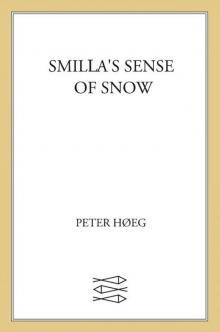 Smilla's Sense of Snow
Smilla's Sense of Snow Borderliners
Borderliners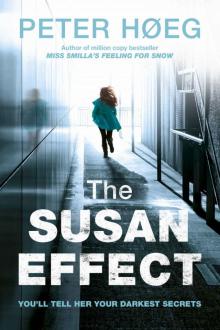 The Susan Effect
The Susan Effect The History of Danish Dreams
The History of Danish Dreams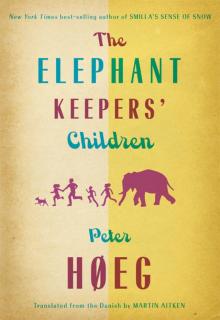 The Elephant Keepers' Children
The Elephant Keepers' Children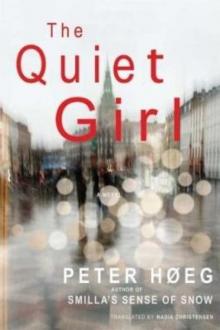 The Quiet Girl - Peter Hoeg
The Quiet Girl - Peter Hoeg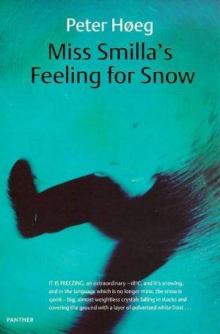 Smilla's Sense of Snow aka Miss Smilla's Feeling for Snow
Smilla's Sense of Snow aka Miss Smilla's Feeling for Snow